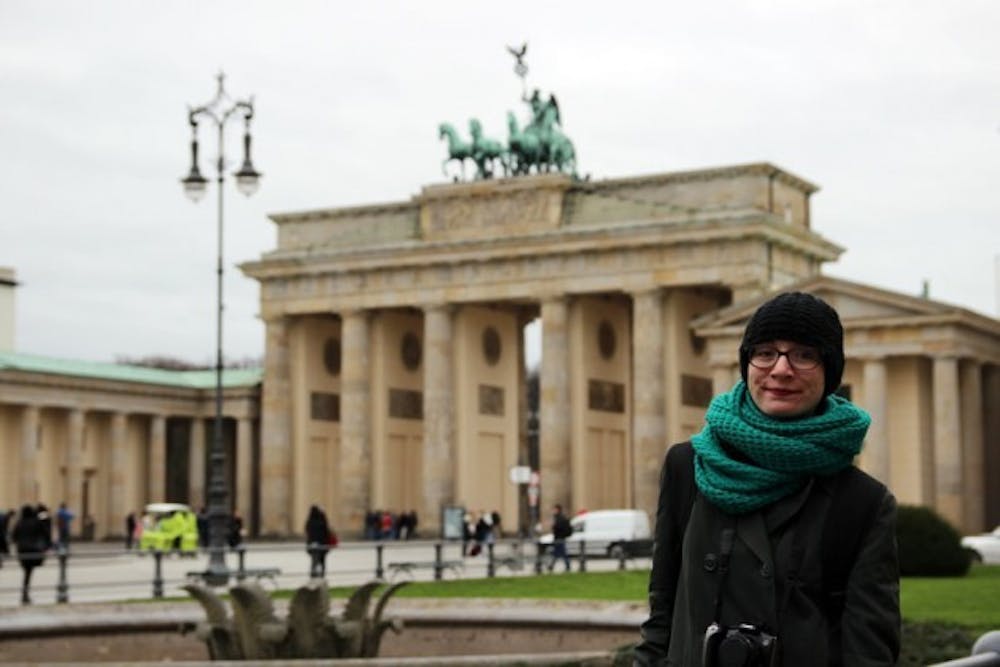My fingers fumbled around my friend’s fingers as her relatively steady hand grasped the round bottom of what must’ve been a clear glass water bottle, dangerously filled with sparkling water. I reached out my right hand and waited for the impact of palm on glass. I was able to surround the bottle’s opening with a couple of fingers and then slowly pull it out from the grip of the somewhat trusted pair of hands. I shifted the bottle to one hand and reached out in front of me towards the table. I felt around my place area for an empty spot to set the bottle down on. A loud clink reverberated off the table and my hands dashed towards my pants, making sure I didn’t dump water all over my lap.
More cautiously than before, I located my glass, the height and width of which couldn’t give me a clue as to how much water to put in it. Nor could I even tell how much water was flowing into the glass as I began to tip the bottle.
“How am I supposed to know how much the glass is filled up?” I said with a slow realization as the water fell – what felt like far too quickly – into the glass.
“Just stick your finger in the glass,” my friend Sara DiNatale said. “That’s what I had to do with my wine.”
“Oh, gross,” I thought. “Sticking my finger in my water. Nice.”
Nonetheless, it was the only legitimate sounding idea voiced from my table comrades. I dunked my newfound organic measuring stick into the glass and proceeded to splash water until it seemed full enough to satisfy my nervous thirst.
I gulped down the half-full glass, leaving it fully empty with a clink on the table.
I straightened my back in the chair and looked around – in vain. I was in absolute darkness, completely pitch black. When we first walked into Nocti Vagus single file – conga style, with a hand on the shoulder of the person in front – my eyes fought to see. Large, connected yellow circles turned and spun before my eyes – a trippy visual I had to confirmed with another student was completely normal, and not a total hallucination.
Travel always rips you out of your vie quotidienne. Travelling puts you on sidewalks you may only encounter once in your life. You stumble into cafés you’ve never seen before and share an U-Bahn car with people who don’t speak your language. At first, you might fight to find the comfortable which will make the new place like what you know.
On a clear-skied Monday night in Berlin, I joined the ranks of the blind for three short hours. During that time, I struggled to determine whether or not I had finished my dinner or was merely stabbing my fork at sauce. I nervously passed plates to the waiter, wholeheartedly expecting to drop it on the floor, or on myself, at any moment. Everyone at the table struggled to make sense of what food they were putting in their mouths.
There are approximately 285 million visually impaired people worldwide, at least 39 million of whom are blind, according to the World Health Organization.
Around one and a half billion Americans went on single-person trips at least 50 miles away from their home in 2013 for leisure purposes, according to the U.S. Travel Association. Billions of people regularly leave behind what they know for something unknown –feeling around blindly for what’s familiar in an unfamiliar place.
Try seeing differently. Or – as in my case – not seeing at all.
But the trip ends, you leave the pitch black, and return to the world of light and the everyday; you go back to normal sidewalks, with bumps and cracks you know better than you’d like to admit, everyone speaks a language you understand and you know what food you’re eating.
Still, normalcy didn’t totally return to me. I went back to work and school within the week of leaving Berlin and my apartment was unsurprisingly the same as when I left (my boyfriend and I didn’t take down our Christmas tree until last week). But in everything I do, Berlin bubbles up inside me. A coffee in Buffalo is always in comparison to a kaffee in Berlin, and that’s the brilliance of travel. Sidewalks aren’t the same once you’ve walked on so many new ones. A dinner in the dark makes you revel in the meals you can see, and respect those who have never seen the food they eat in their lives.
The normal becomes special when you have a new context in which to see it.
email: emma.janicki@ubspectrum.com





